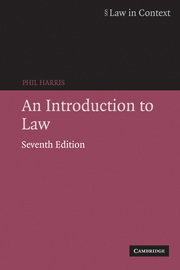Book contents
- Frontmatter
- Contents
- Preface
- Table of statutes
- Table of cases
- 1 Law and society
- 2 Law and morality
- 3 Law and the regulation of economic activity
- 4 Some important legal concepts
- 5 Law and property
- 6 Law and the settlement of disputes
- 7 The making of legal rules
- 8 The European dimension of English law
- 9 Liability in English law: the law of tort
- 10 Liability in English law: crime and the criminal justice system
- 11 The development and the role of the contract
- 12 Law and government
- 13 The legal profession
- 14 The judges
- Index
14 - The judges
- Frontmatter
- Contents
- Preface
- Table of statutes
- Table of cases
- 1 Law and society
- 2 Law and morality
- 3 Law and the regulation of economic activity
- 4 Some important legal concepts
- 5 Law and property
- 6 Law and the settlement of disputes
- 7 The making of legal rules
- 8 The European dimension of English law
- 9 Liability in English law: the law of tort
- 10 Liability in English law: crime and the criminal justice system
- 11 The development and the role of the contract
- 12 Law and government
- 13 The legal profession
- 14 The judges
- Index
Summary
Although we often speak of ‘the judges’ as though they were a homogeneous group within the court and judicial structure, there is in fact a whole variety of judges, operating in different courts and at different levels in the court hierarchy (quite apart from those legally qualified persons who chair tribunals). At the top of the hierarchy of courts of law are members of the House of Lords and the Court of Appeal, appointed from the ranks of Court of Appeal judges and High Court judges respectively; lower down, the judges of the High Court are appointed from among senior and eminent barristers; and at county court level, Circuit Judges and Recorders are appointed from the ranks of the legal profession – at present still mainly from barristers, though in June 2006, around 10% of Recorders were solicitors.
The exception to this general pattern of judicial recruitment from amongst practising barristers is, of course, found in the magistrates' courts, where the bench only exceptionally comprises trained lawyers; usually, laymen and women are appointed as Justices of the Peace on the basis of their experience and general standing in the local community. Although they receive some training in the law, magistrates are to a large extent dependent for legal knowledge upon their clerks, who are legally qualified and whose task it is to advise the court on matters of law in cases heard before them.
Information
- Type
- Chapter
- Information
- An Introduction to Law , pp. 445 - 472Publisher: Cambridge University PressPrint publication year: 2006
